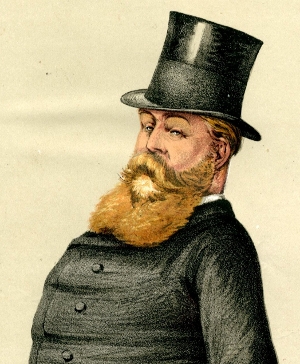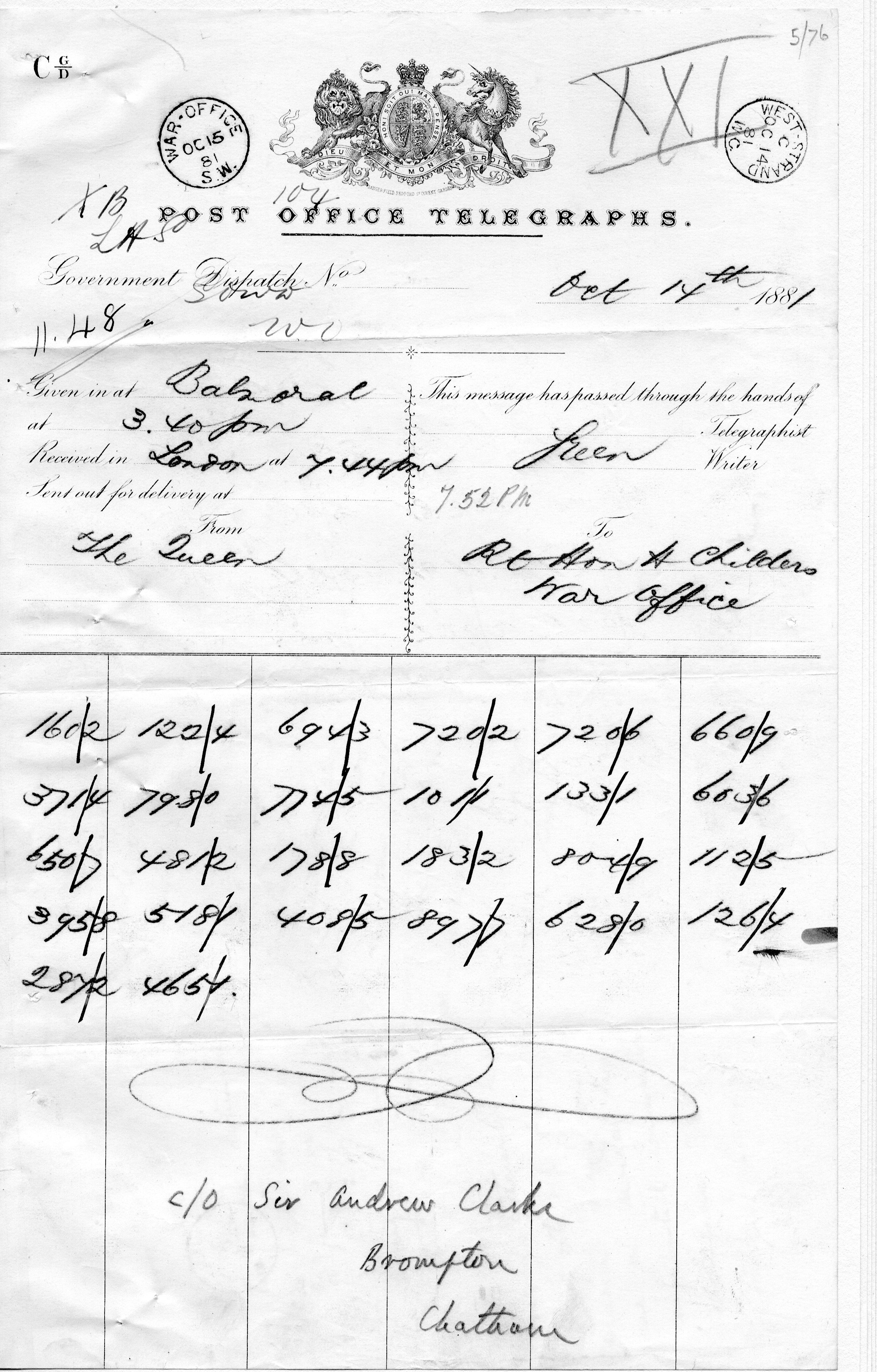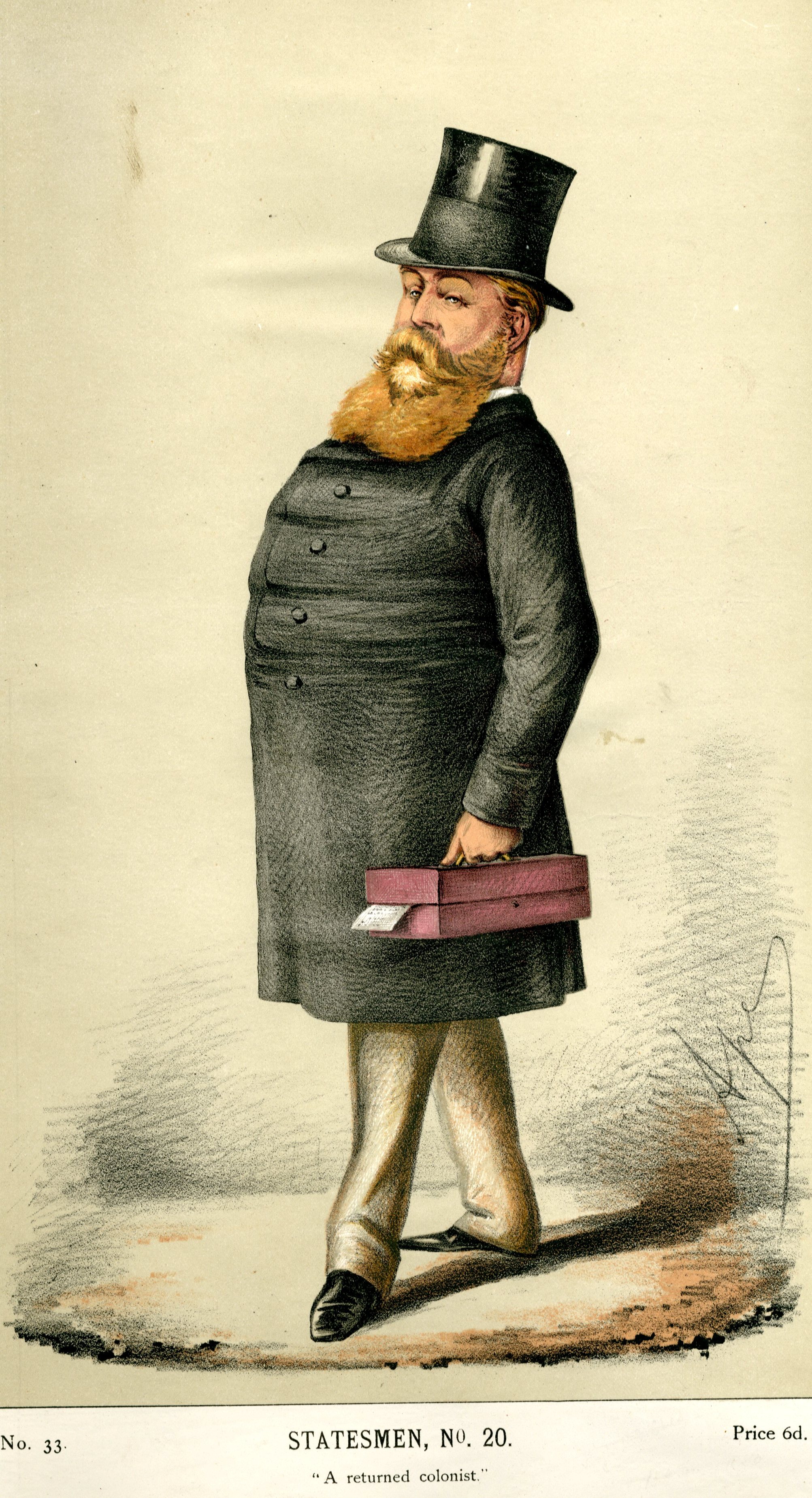A challenge to amateur spies: the Hugh Childers papers
The Royal Commonwealth Society department is completing a detailed online description of the papers of the politician Hugh Childers (1827–1896). One of the most fascinating items in the collection is a cipher personal telegraph from Queen Victoria to Childers sent during his time as secretary of state for war. It expresses her displeasure at his championship of Sir Garnet Wolseley, whom he wished to appoint as adjutant general of the army. It is reproduced below as a challenge to any amateur spies who may be clever enough to break the British government’s secret code.
Childers enjoyed a successful political career, which began in Victoria, Australia, where he emigrated in 1850. He rose quickly in the colonial administration. In 1856 Childers was returned to the state’s first parliament and served in the cabinet as commissioner of trades and customs. Childers was a key figure in the foundation of the University at Melbourne and served as its first vice-chancellor.
Childers returned to Britain in 1857 and embarked upon a career in British politics, entering parliament in 1860 as a member of the Liberal Party. In 1865 he was appointed financial secretary to the Treasury, under William Gladstone, who was chancellor of the exchequer. Childers became a firm supporter of Gladstone, whom he had impressed with his zeal and ability. Gladstone’s confidence was expressed by Childers’ appointment to a succession of high offices: first lord of the Admiralty (1860); secretary of state for war (1880); chancellor of the exchequer (1882); and home secretary (1886). When Childers retired from active politics in 1892, Gladstone paid this tribute to his achievements: ‘It is my privilege to look back upon our early cooperation … and to think with satisfaction that you left your mark upon more than one of the great Departments of the State in such a way as to give you a distinguished place in the annals of British Administration’ (Gladstone to Childers, 17 July 1892).
The telegram and one of the largest sections of Childers’ political correspondence relate to what Gladstone termed the ‘Wolseley imbroglio.’ As Secretary of State for War, Childers wished to appoint Sir Garnet Wolseley adjutant general, because he shared the government’s vision of army reform. Wolseley, however, was anathema to Queen Victoria’s cousin, the duke of Cambridge, who was commander-in-chief. Cambridge was a traditionalist, whom Wolseley had rather transparently denounced at a public function as one of ‘those great boulders of prejudice and superstition who now impede the way.’ Cambridge threatened to resign if Wolseley were forced upon him. Sympathetic to her cousin, Victoria blocked the government’s desire to confer a peerage upon Wolseley. Her opposition to his promotion placed Gladstone in a difficult position, confronting him with the question of ‘how far the objections of the Sovereign ought to weigh in the matter of personal appointments.’ Gladstone however considered that, ‘much weight may be given to the reason, or even the unreason, of the Sovereign; but, when there are Reasons of Public Policy closely involved, then I conceive that for me to give way is an abandonment of duty, and a commencement of the process of sapping the constitution’ (Gladstone to Hartington, 25 Sept. 1881). In the same letter, Gladstone tactfully suggested that he could be as stubborn as Victoria, ‘she has qualities in herself which might prepare her for the possibility of obstinacy in others,’ and the government pushed through the appointment of Wolseley in March 1882.
The text of the deciphered telegram will be posted in a few weeks time along with the link to the Janus catalogue entry.




Writing on 26 October. Has the solution been published yet?
Hi James,
The decoded telegram and another fascinating glimpse into the Childers papers will be published early next week.
Best wishes,
John
Can you provide the link?
Dear James,
Please see the post of 4 Nov. for the text of the decoded telegram:
https://specialcollections-blog.lib.cam.ac.uk/?p=1387
Regards,
John
Dear James,
Please see the post of 4 Nov. for the text of the decoded telegram:
https://specialcollections-blog.lib.cam.ac.uk/?p=1387
Regards,
John